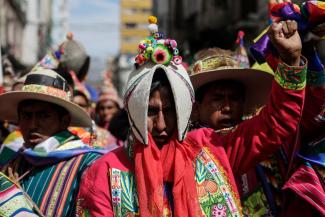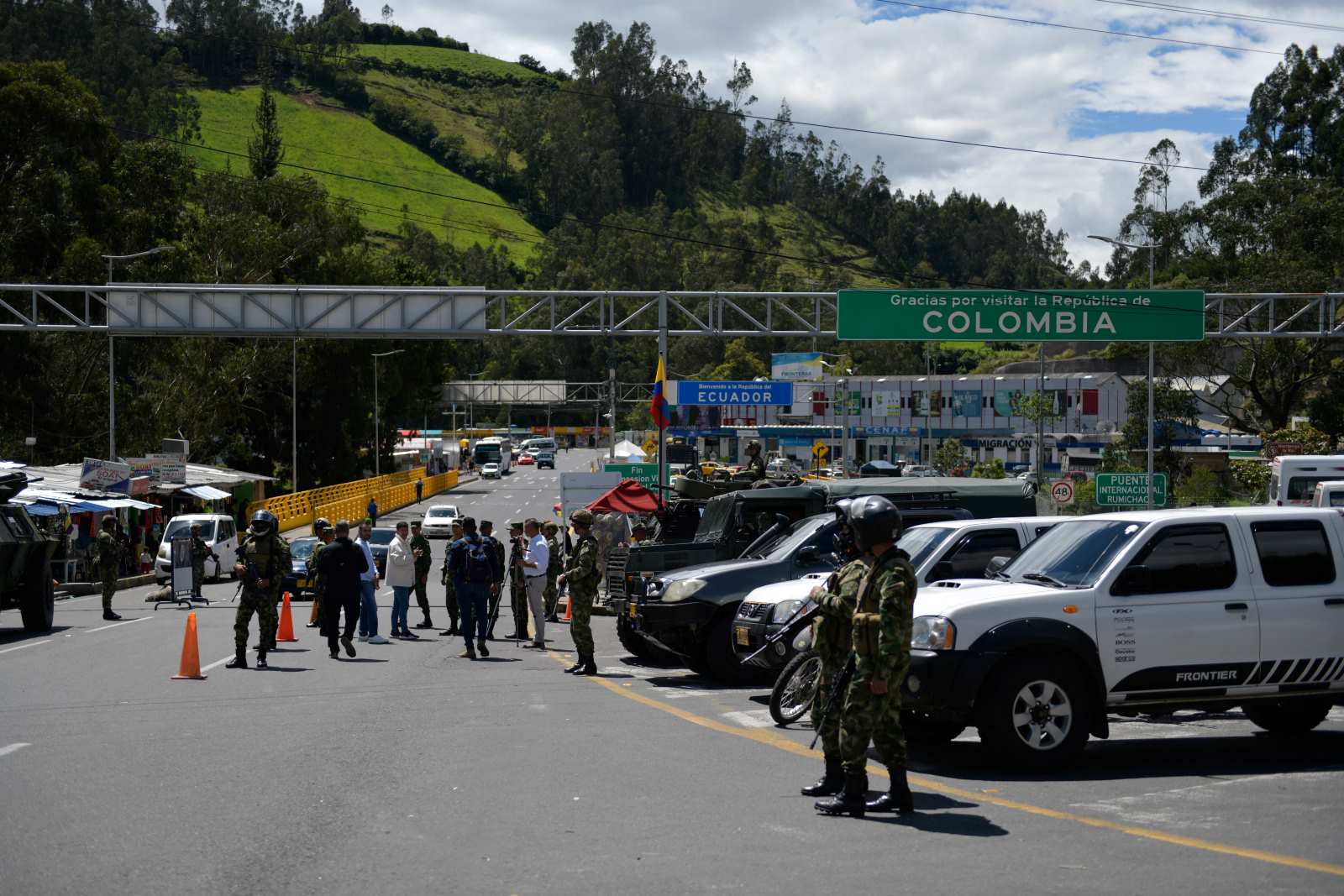Latin America
Indigenous politics in Ecuador and Bolivia

At the beginning of the century, Latin American politics shifted to the left: after decades of neoliberalism, a wave of protest swept over the continent. Left-leaning candidates took over the presidency in one country after another. It started in 1998 with Hugo Chávez in Venezuela and continued in Chile, Argentina, Brazil, Bolivia, Uruguay, Ecuador, Nicaragua, Honduras, Guatemala and El Salvador – though candidates’ political platforms ranged widely from moderate social democracy to populist nationalism.
The election of the indigenous Evo Morales in Bolivia made international headlines. Both Morales in Bolivia and President Rafael Correa in Ecuador practised a form of identity politics that harked strongly back to indigenous culture. Their policies have brought about far-reaching positive change in both countries.
The left turn in Latin America was a reaction to the unfulfilled promise of neoliberalism, which had been rigorously applied in almost all the countries of the region up to that point. At the end of the twentieth century, neoliberal policies had managed to balance the finances of the region through hugely unpopular shock strategies, yet they did not deliver jobs or social justice. Instead, social inequality sharply increased: in 1999, the United Nations Economic Commission for Latin America and the Caribbean (ECLAC) estimated that 35 % of Latin American households lived in poverty and 14 % in extreme poverty. In absolute numbers, that means that there were 211 million poor and 89 million destitute people.
Most people also felt that the political parties no longer represented them. They only seemed to be competing for power in order to secure advantages for their increasingly closed circle of oligarchic elites. In short, the party system was no longer functioning. The gap between politics and civil society was neoliberalism’s weakest point.
As social protests broke out, most governments initially responded with repression. But the movement was strong: in 18 Latin American countries, there were 64 % more protests in 2001 than there had been in the year before. In some countries, presidents were unable to finish their terms in office. For example, Bolivian President Gonzalo Sánchez de Lozada left office in October 2003 following massive protests. This event was preceded by 67 dead and 417 injured. In Ecuador, the retired colonel Lucio Gutiérrez was forced out of office in April 2005 by a civilian coup d’état, the so-called “rebellion of the outlaws”.
The promises of nationalism
Many citizens hoped that the new governments would bring about a change in the political elite. The state should regulate the economy again. Neoliberalism had relied on the private sector, but now the government was expected to take a leading role.
Natural resources would also no longer be in private hands but would go back to the government. In Ecuador, Correa expropriated the oil and mining sector. In Bolivia, Morales nationalised gas extraction, telecommunications, the railroad, and mineral-processing companies.
In doing so, both presidents used strong patriotic rhetoric. In Latin America, left-wing parties in particular tend to use nationalism as an argument to nationalise natural resources. They also use anti-imperialism to justify their rejection of private entrepreneurship. Ideas and arguments from the decolonialism discourse were employed too: colonialism supposedly imposed western forms of knowledge on Latin American cultures, even though they had their own ways of generating and sharing knowledge.
Identity politics could be deployed especially effectively in Bolivia and Ecuador because of their large indigenous populations. Morales and Correa came to power by promising a return to indigenous values, though they emphasised the topic to differing degrees and its influence varied.
Differences between Bolivia and Ecuador
Correa was a caudillo – a charismatic leader – without a party structure, an outsider without a political past. He comes from the prosperous middle class of Guayaquil, one of the largest cities in Ecuador. He achieved remarkable academic success and earned a PhD in economics from the University of Illinois. His views on sexual identity and drug legalisation were rather conservative.
Evo Morales, on the other hand, comes from a poor, indigenous family. As a young man, he had to earn money as a trumpet player to get by. Like many people, he left western Bolivia and moved to the Chapare region to cultivate coca. He has no formal education other than six years of primary school. In Chapare, he became a politician and was elected to parliament as a direct candidate.
Constitutional reforms
Both presidents initiated a constitutional reform process in their respective countries. In Bolivia, the new constitution was approved in a referendum in January 2009 and subsequently promulgated by Morales. The preamble states: “We have left the colonial, republican and neo-liberal State in the past. We take on the historic challenge of collectively constructing a Unified Social State of Pluri-National Communitarian law”. This heralded a new era – no longer based on a republic, but on indigenous principles and community law.
Correa had promulgated Ecuador’s new constitution one year earlier. It states that the people of Ecuador recognise “our age-old roots, wrought by women and men from various peoples” and celebrate “nature, the Pacha Mama (Mother Earth), of which we are a part and which is vital to our existence”. Later, it claims that the people have decided to “build a new form of public coexistence […] to achieve the good way of living, the sumak kawsay”. Although the connection to indigenous roots is also evident, it does not go as deep as in Bolivia: Ecuador’s constitution preserves a republican form of government and does not place an indigenous worldview at the centre of the new state.
In both countries, the composition of the political elite also changed with the new governments. Correa attracted orthodox Maoists and former members of the right-wing Christian Social Party, as well as liberation theologians, environmentalists, human-rights activists, indigenists and leftist academics.
“Pacto de Unidad”
In Bolivia, the new political leadership completely replaced the traditional elites, including those on the left. The “Pacto de Unidad” (Pact of Unity), an alliance of highland and lowland indigenous organisations and rural labour unions, now wielded significant influence. Morales’ party, the Movimiento al Socialismo (MAS), is a coalition of social movements in which highland indigenous farmers’ organisations hold the political decision-making power. Therefore, although Morales had a considerable amount of authority, he was accountable to various organisations, especially indigenous organisations and social movements.
The political transformation in Bolivia cannot simply be explained as a change from right-wing to left-wing policies. Instead, it was much more complex and was first and foremost a transition to indigenous identity politics. The MAS Party under Morales has not only taken typical leftist measures like nationalising companies. It also placed the political, economic and cultural worldview of indigenous peoples at the centre of its policies. This change did not happen to the same extent in Ecuador. Although multiple companies were also nationalised, indigenous organisations distanced themselves from Correa’s government and have taken a critical view of it.
Both governments have had a long-term impact on their countries. Ecuador recently held an election. The left-wing candidate from Correa’s party narrowly lost to her conservative opponent in the run-off election. In Bolivia, the MAS once again won the 2020 presidential elections, which enabled Morales to return from exile, where he had fled in response to the unrest – triggered by allegations of electoral fraud against him – after the 2019 elections.
Franz Flores Castro is a political scientist, professor and researcher at the San Francisco Xavier University in Sucre, Bolivia.
flores.franz@usfx.bo









